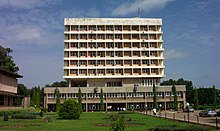Ikara is a town and local government area (LGA) in Kaduna State, northern Nigeria, located around (85km) north-east from the city of Zaria. Ikara as an LGA consists of these towns its located between 10°2¹ to 11°5¹ north and villages: Ikara, Malikachi, Furana, Danlawan, Kurmin Kogi, Janfalan, Auchan, Paki, and Pala.

Kaduna State is a state in the northwest geopolitical zone of Nigeria. The state capital is its namesake, the city of Kaduna, which was the 8th largest city in the country as of 2006. Created in 1967 as North-Central State, which also encompassed the modern Katsina State, Kaduna State achieved its current borders in 1987. Kaduna State is the fourth largest and third most populous state in the country, Kaduna State is nicknamed the Centre of Learning, owing to the presence of numerous educational institutions of importance within the state such as Ahmadu Bello University.

Katsina State is a state in the northwestern geopolitical zone of Nigeria. Katsina State borders on the Republic of Niger to the north for 250 km and the States of Jigawa for 164 km and Kano to the east, Kaduna to the south for 161 km and Zamfara to the west. States. Nicknamed the "Home of Hospitality", both the state capital and the town of Daura have been described "ancient seats of Islamic culture and learning" in Nigeria.

The Bayero University Kano (BUK) is a university situated in Kano, Kano State, Nigeria. It was founded in 1975, when it was renamed from Bayero University College and upgraded from University College to University. It is the first university in Kano State, North-western Nigeria.

The Zazzau, also known as the Zaria Emirate, is a traditional state with headquarters in the city of Zaria, Kaduna State, Nigeria. The current emir of Zazzau is H.E Alhaji Ahmed Nuhu Bamalli CFR, who succeeded the former emir, late Alhaji Shehu Idris.
The Kaduna Mafia is a loose group of Nigerian businessmen, civil servants, intellectuals and military officers from Northern Nigeria, who resided or conducted their activities in Kaduna, the former capital of the region towards the end of the First Republic.
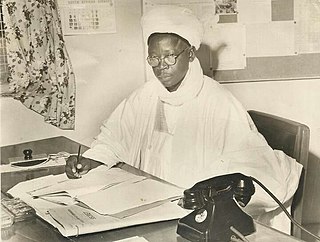
Abubakar Imam ' was a Nigerian writer, journalist and politician from Kagara, Niger in Nigeria. For most of his life, he lived in Zaria, where he was the first Hausa editor of Gaskiya Ta Fi Kwabo, the pioneer Hausa-language Newspaper in Northern Nigeria.
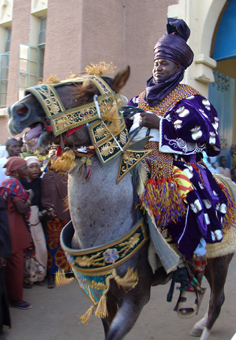
The Durbar festival is an ancient traditional annual Hausa; cultural, religious and equestrian festival, celebrated as a core part of the Arewa Hausa culture. Durbar has existed for centuries and is as an essential part of Hausa kingdom and Hausa tradition. Durbar is a paramount part of Hausa cultural rites, tradition and history and the Hausa's are renowned in history as ancient horsemen and warriors of the Sahara and the Sahel.

Barewa College is a college in Zaria, Kaduna State, northern Nigeria. Founded in 1921 by British Governor General Hugh Clifford, it was originally known as Katsina College. It switched its name to Kaduna College in 1938 and to Government College, Zaria in 1949 before settling on Barewa College. It is one of the largest boarding schools in Northern Nigeria and was the most-celebrated post-primary schools there up to the early 1960s. The school is known for the large number of elites from the region who attended and counts among its alumni include Tafawa Balewa who was Prime Minister of Nigeria from 1960 to 1966, four heads of state of Nigeria. The school is located along Gaskiya road in the Tukur -Tukur area of Zaria.
Shehu Ladan was a Nigerian lawyer, philanthropist and oil and gas management strategist from Kaduna State. Who has contributed to the socio-economic activities of the state and Nigeria at large in different capacities. He was the immediate past Group Managing Director of NNPC in Nigeria.
Lere is a Local Government Area and town in southern Kaduna State of Nigeria. Lere town is located geographically at the latitude 10 degrees 39 North and longitude 8 degrees 57 East. It is the headquarters of the Lere Emirate. The town and its environs has an estimated population of about 93,290 (2016). Lere Local Government has an area of 2,634 km2 and a population of 339,740 at the 2006 census. Its headquarters are in the town of Saminaka. The postal code of the area is 811.
Sabon Gari Local Government is a local government area in Kaduna State, Nigeria. It is one of the local government areas in the Zaria metropolis as well as being one of the districts of the Zazzau Emirate Council. The towns and villages are Dogarawa, Bomo, Basawa, Zabi, Samaru, Kwari, Barashi, Muchiya and Palladan. The Local Government council is chaired by Alhaji Mohammed Usman.

The Emir of Zazzau, known as Sarkin Zazzau in Hausa is the traditional ruler based in Zaria, which was also known as Zazzau in the past. Although in centuries past, the emirs ruled as absolute monarchs, in the 20th and 21st centuries Nigerian traditional rulers hold little constitutional power, but wield considerable behind-the-scenes influence on the government. The emir's residence is in the historic palace in the town of Zaria.
Abdur Rahman Atiku sometimes known as Abdu or Abd al-Rahman bin Atiku was the Sultan of Sokoto from 1891 to 1902. In earlier vacancies, he had been a contender from the house of Atiku, but the house had been passed over three times since the death of Ahmadu Rufai in 1873. Abubakar Na Rabah, Mu'azu, and Umaru bin Ali subsequent Sultans after Rufai were from the house of Muhammed Bello.

Shehu Idris was a Nigerian teacher who served as the 18th Emir of Zazzau, a Nigerian traditional state headquartered in Zaria. He also served as chairman of Zazzau Emirate Council and Kaduna State Council of Chiefs. A member of the Fula people, he ascended the throne on 8 February 1975 following the demise of Alhaji Muhammadu Aminu, his predecessor. Idris was the longest reigning monarch in the history of the Zazzau emirate, having reigned for 45 years from 1975 to 2020. He was succeeded by Ahmed Nuhu Bamalli as the 19th Emir of Zazzau.
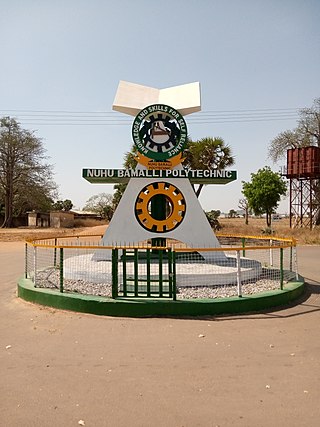
Nuhu Bamalli Polytechnic is a tertiary education institution in Zaria Kaduna State, Nigeria. The polytechnic was established on 2 February 1989 by the Kaduna state government to provide training and development techniques in the Field of engineering, applied science, commerce and other spheres of learning. The polytechnic is one of the tertiary teaching institutions owned and managed by the Kaduna State government. The polytechnic was named after the then Nigeria's foreign minister Nuhu Bamalli. In August 2022, Barrister Abdullahi Zubair Abdullahi was appointed the new Registrar of the polytechnic.
Gates of Hausa kingdoms are gates or walls (ganuwa) that formerly enclosed Hausa kingdoms. In ancient times, each kingdom was enclosed with a wall that contained various gates. During battles, the gates were closed as a war strategy. Each gate has a name and a gatekeeper. In the past, especially at night, the gatekeeper was in charge of a single gate at all time. All of the gates are assigned to a single person today.

Ahmed Nuhu Bamalli CFR is a Nigerian lawyer, banker and diplomat. He is the former Nigerian ambassador to Thailand with concurrent accreditation to Myanmar, and the current 19th Fulani Emir of Zazzau, a Nigerian traditional state with headquarters in Zaria, Kaduna State, Nigeria. He is the first Emir from the Mallawa ruling house to be enthroned in a century after the dethronement of his grandfather, Emir Alu Dan Sidi in 1920.
Ahmadu Bello UniversityZaria is a federal government research university located in Zaria, Kaduna State, Nigeria, opened in 1962 as the University of Northern Nigeria. It was founded by and is now named for Ahmadu Bello, the first premier of Northern Nigeria.
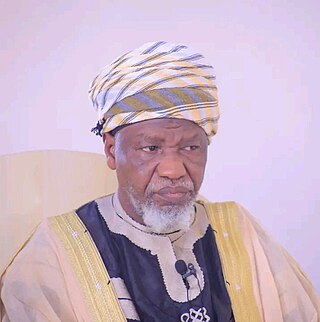
Sulaiman Muhammad Adam is the Chief Imam of Sultan Bello Mosque in Kaduna State,, Sulaiman began leading the Juma'at prayer on 6 January 2017.








